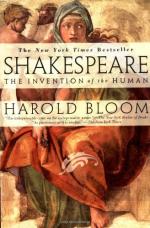
|
| Name: _________________________ | Period: ___________________ |
This test consists of 15 multiple choice questions and 5 short answer questions.
Multiple Choice Questions
1. Which critic is NOT a 'romantic' critic?
(a) A.C. Bradley.
(b) Samuel Johnson.
(c) Hazlitt.
(d) W. H. Auden.
2. How does Bloom characterize "Richard III"?
(a) Improbable.
(b) Successful.
(c) Absurd.
(d) A spectacle.
3. How does Bloom characterize "Two Gentlemen of Verona"?
(a) As inaccurate.
(b) As convoluted.
(c) As weak.
(d) As fantasy.
4. Who is Queen Mab, according to Bloom?
(a) The whore Mab.
(b) Queen Elizabeth I.
(c) Mercutio's wife.
(d) The powerful mobs of London.
5. How does Bloom characterize "Much Ado About Nothing"?
(a) Shakespeare's most perfect play.
(b) Nietzschean.
(c) A disorganized jumble.
(d) A Biblical comedy.
6. What does Bloom say makes Caesar fascinating?
(a) His power.
(b) His violence.
(c) His bombast.
(d) His humility.
7. What is it about "Richard III" that leaves Bloom dissatisfied?
(a) The improbability of Lady Anne's seduction.
(b) The excess of self-consciousness in the characters.
(c) The lack of strong motivations for Richard.
(d) The lack of inner dialogue.
8. How does Bloom characterize "Romeo and Juliet"?
(a) Heart-breaking.
(b) Absurd.
(c) Bittersweet.
(d) Top-heavy.
9. In what way has Shakespeare outdone Marlowe with Aaron the Moor?
(a) He is more compassionate than Barabas.
(b) He is more hateful than Barabas.
(c) He is more outrageous than Barabas.
(d) He is more believable than Barabas.
10. Who does Julia look for, while she is disguised?
(a) Proteus' dog.
(b) Valentine.
(c) Silvia.
(d) Proteus.
11. What do writers tend toward, after Shakespeare, according to Bloom?
(a) Oedipal urges.
(b) Political visions.
(c) Sadomasochism.
(d) Self-reflection.
12. What did Shakespeare create with pain, in Bloom's interpretation?
(a) Memory.
(b) Poetry.
(c) History.
(d) Culture.
13. What does Faulconbridge save of his father's?
(a) His father's power.
(b) His father's philosophy.
(c) His father's estate.
(d) His father's honor.
14. What does Bloom reiterate about Christopher Marlowe?
(a) That he was a youngest son.
(b) That he drank heavily while writing.
(c) That he was older than Shakespeare.
(d) That he was murdered by English government agents.
15. How does Bloom characterize the end of "Richard III"?
(a) Fulfilling.
(b) Disorganized.
(c) Repetitive.
(d) Symphonic.
Short Answer Questions
1. Who does Bloom say steals the show in "Romeo and Juliet"?
2. To whom does Bloom compare Hamlet and Falstaff?
3. To whom does Bloom compare Puck unfavorably?
4. What does Bloom say is the purpose of Falstaff's philosophizing?
5. How does Bloom characterize Shylock?
|
This section contains 378 words (approx. 2 pages at 300 words per page) |

|




